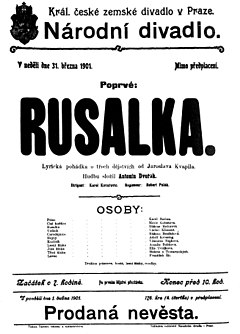| Rusalka | |
|---|---|
| Opera by Antonín Dvořák | |
 Poster for the premiere | |
| Librettist | Jaroslav Kvapil |
| Language | Czech |
| Based on | fairy tales by Karel Jaromír Erben and Božena Němcová |
| Premiere | 31 March 1901 Prague |
Rusalka (pronounced [ˈrusalka] ), Op. 114, is an opera ('lyric fairy tale') by Antonín Dvořák. His ninth opera (1900–1901),[1] it became his most successful, frequenting the standard repertoire worldwide. Jaroslav Kvapil wrote the libretto[2] on Karel Jaromír Erben's and Božena Němcová's fairy tales. The rusalka is a water sprite from Slavic mythology; it usually inhabits a lake or river.
For many years unfamiliarity with Dvořák's operas outside the Czech lands helped reinforce a perception that composition of operas was a marginal activity, and that despite the beauty of its melodies and orchestral timbres Rusalka was not a central part of his output or of international lyric theatre. In recent years it has been performed more regularly by major opera companies.[1] In the five seasons from 2008 to 2013 it was performed by opera companies worldwide far more than all of Dvořák's other operas combined.[3]
The most popular excerpt from Rusalka is the soprano aria, the "Song to the Moon" ("Měsíčku na nebi hlubokém") for the title character in act 1, which is often performed in concert and recorded separately. It has also been arranged for violin and used on film soundtracks.
- ^ a b Cite error: The named reference
Loppertwas invoked but never defined (see the help page). - ^ Šíp, Ladislav (2005). "Beloved National Opera by Dvořák". Rusalka (Prague National Theatre Orchestra, conductor: Jaroslav Krombholc) (CD). Kohoutová, Joy (trans.). Prague: Supraphon. pp. 8–15. SU 3811-2.
- ^ "Works by Dvorak, A".[dead link] In the five seasons from 2008/09 through 2012/13, Rusalka had 124 productions (performance runs), The Devil and Kate 7, The Jacobin 5, Armida 2, and The Spectre's Bride, one, totaling 15 for the other operas combined. Vanda had a performance run March through May 2014. . Operabase. Retrieved 16 August 2014